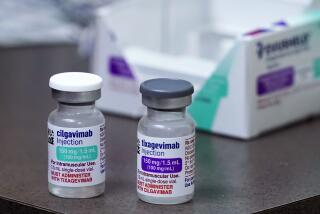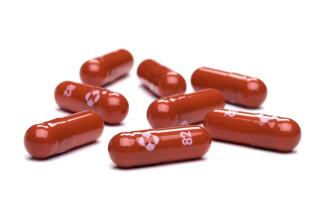AIDS Drugs Offer Hope to Patients : Various Remedies Being Tested or Are in Unofficial Use
- Share via
Only one anti-AIDS drug is licensed for use in the United States: Azidothymidine (AZT), sold under the name Retrovir. AZT costs from $8,000 to $12,000 a year per patient and can cause serious anemia resulting in frequent blood transfusions, especially for patients with more advanced AIDS. It is available only to two documented groups of patients: those with pneumocystis carinii pneumonia and those whose T-4 cell counts have dropped to critical levels below 200.
But there are many antiviral and immunomodulatory compounds and substances being actively considered by medical researchers and drug companies in the United States and abroad. Some not approved here but believed by researchers to hold promise are:
- DDC, dideoxycytidine, a sister compound of AZT that is believed to interfere with replication of the AIDS virus, is possibly as effective as AZT and less toxic. The National Cancer Institute is testing DDC in AIDS patients at Stanford University and at the University of Miami. In combination with Hoffmann-La Roche, the drug firm that has licensed DDC from the government, the National Institutes of Health has started preliminary trials in AIDS patients at numerous research centers around the country.
- Ribavirin, another anti-viral compound that is licensed under the name Virazole for medical use in more than 30 countries, including Mexico, can be used in the United States only in aerosol treatment of infants and young children who have acute respiratory disease caused by respiratory syncytial virus (RSV). U.S. trials by Viratek, the division of ICN Pharmaceuticals that manufactures the drug, have been completed, but a physician-sponsored study approved by the FDA is still under way at St. Vincent Medical Center. Some other AIDS and ARC patients still are receiving the drug in “open trials,” the non-controlled, non-placebo continuation of trials.
- Dextran sulphate, a polysaccharide compound used in Japan for almost 20 years as an anticoagulant and for lowering cholesterol levels, has proved in lab tests in Japan as effective against the HIV virus as the antivirals. Also, in Japanese laboratory tests, when combined with AZT, dextran sulphate was almost 100% effective in killing the virus. Dr. Donald Abrams of UC San Francisco Medical School, who has worked closely with Japanese doctors, will begin trials in AIDS patients this month. In his FDA-approved study, Abrams will use only dextran sulphate, not AZT.
- AL 721, a phospho-lipid compound developed by cancer researchers in Israel and shown in laboratory tests to be effective in inhibiting the HIV virus. The FDA recently has approved larger studies. It is imitated in people’s kitchens using a home formula, widely circulated by AIDS guerrilla clinics, that calls for high-strength egg lecithin concentrate, water and butter or oil.
- DNCB, a compound applied topically, is used in developing photographic film and sometimes used medically in treating warts. A San Francisco dermatologist reported in 1986 that applying small quantities to a spot on the inner arms of 26 patients appeared to improve T-4 cell counts of some. Other AIDS patients, who have received vials of DNCB mixed with Vaseline Intensive Care lotion through guerrilla clinics, say it also reduces lesions from Kaposi’s sarcoma, a skin cancer resulting from AIDS in some patients. Some researchers fear that patients who use DNCB without taking an anti-viral may risk increasing the number of HIV particles that will infect previously uninfected T-4 and other cells. No formal medical research studies yet have been published.
- Isoprinosine, an immunomodulator drug available in 80 countries, reportedly affects certain activities of the immune system by increasing natural killer cell (NK cell) activity in vitro. Trials are now under way in the United States in people with AIDS-related immunodeficiency and it is on sale in Mexican pharmacies. In California, many HIV-positive individuals purchase both Ribavirin and Isoprinosine in Mexico and take in a combined dosage.
- Imuthiol (DTC), studied initially in Paris, is an immunomodulating compound that has been found to increase T-4 cell numbers. It is currently the subject of trials in the United States. Some people have obtained their own DTC, a commonly available chemical long used in agriculture and as chelating agent in the manufacture of rubber.
- Aloe vera juice extract recently has been reported as clinically effective in AIDS patients, with long-term use resulting in a decreased number of infections and improved state of health. Like dextran sulfate, the active ingredient in aloe vera juice is a long-chain polysaccharide. Some AIDS patients already drink the liquid aloe vera, available in health food stores and from buying cooperatives for persons with AIDS.
- Monolaurin, a monoglyceride long approved in the United States for use as a nontoxic food additive to help retard the growth of viruses in foodstuffs. Believed to be an effective antiviral, antifungal and antiprotozoal, and may be effective against lipid encapsulated viruses such as HIV. No formal studies are being done at this time in the United States.
- Among dozens of other drugs and compounds being tried are: Alpha Interferon, aerosol Pentamidine, Ampligen, Beta Interferon, Cyclosporin A, D-Penicillamine, Foscarnet, DHPG, Gamma Interferon, Interleukin 2, Lithium Carbonate, Naltrexone and Peptide T.
More to Read
Sign up for Essential California
The most important California stories and recommendations in your inbox every morning.
You may occasionally receive promotional content from the Los Angeles Times.










